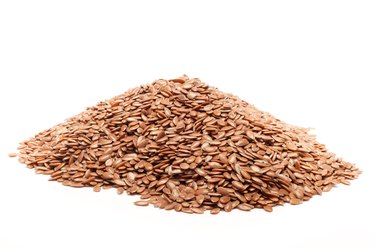
Flaxseeds are high in fiber, vitamins, healthy fats and several minerals. They blend in easily with smoothies, cereals and baked goods to help give you a boost on your fiber and nutrient intake. Even though flaxseeds are a highly beneficial addition to your diet, eating too many can give you a bellyache.
Whole Vs. Ground Flaxseeds
Video of the Day
You can certainly eat whole flaxseeds, but your body isn't likely to digest them well. Stomach problems can arise because you probably won't be able to chew whole flaxseeds thoroughly, forcing them to pass through, virtually undigested. This can give you stomach pains if you have a lot of flaxseeds. You're better off eating ground flaxseeds. You'll be breaking up the hard-to-chew outer hull while exposing the nutrients sealed up inside. This should make them somewhat easier for your body to digest. Having a large serving of ground flaxseeds can be also problematic, however.
Video of the Day
Too Much Fiber
Just 1 tablespoon of flaxseeds provides roughly 3.3 grams of total fiber. While that fiber is helpful for removing waste from your body, too much of it could be troublesome. Consuming a high dose of fiber often leads to bloating, flatulence and stomach cramps, especially if you don't normally consume much fiber. Ultimately, you want to get 28 grams of fiber daily, based on a 2,000-calorie diet -- the recommendation is 14 grams per 1,000 calories, as stated in the publication "Dietary Guidelines for Americans, 2010." But you'll want to gradually work up to this requirement and take small doses of flaxseeds to prevent side effects.
Other Fiber Considerations
About one-third of the fiber in flaxseeds is soluble. For some, this type of fiber has a laxative effect. So if you sprinkle a heaping spoonful onto your breakfast cereal, you could be running for the bathroom shortly after eating, as the soluble fiber races through your gut. Instead of one large dose of flaxseeds, have just half a teaspoon or so to start if they're giving you stomach problems. Then up your intake every several days, as tolerated, until you meet your fiber goals. Cut back if you start experiencing belly issues again.
Allergy Considerations
Even after decreasing your intake of flaxseeds, if you continue to experience stomach pain, it's time to see your doctor. Nausea, diarrhea, vomiting and abdominal cramps are all sometimes associated with mild food allergies. If you also have rashes, hives, swollen lips or wheeze when you breathe after eating flaxseeds, your allergy is more severe. You'll have to get emergency care if these symptoms occur. Severe allergies can send you into anaphylactic shock, a condition that can be life-threatening.
- MedlinePlus: High-Fiber Foods
- National Center for Complementary and Alternative Medicine: Flaxseed and Flaxseed Oil
- Food Allergy Research & Education: Symptoms
- U.S. Department of Agriculture and U.S. Department of Health and Human Services: Dietary Guidelines for Americans, 2010
- Flax Council of Canada: Flax FAQ
- Harvard University Health Services: Fiber Content of Foods in Common Portions
- Mercola.com: 7 Important Reasons to Properly Chew Your Food